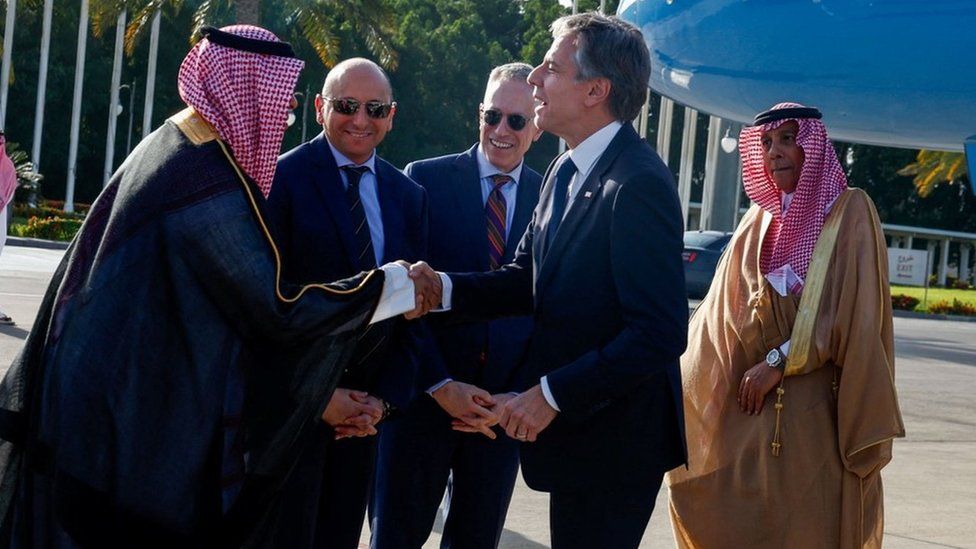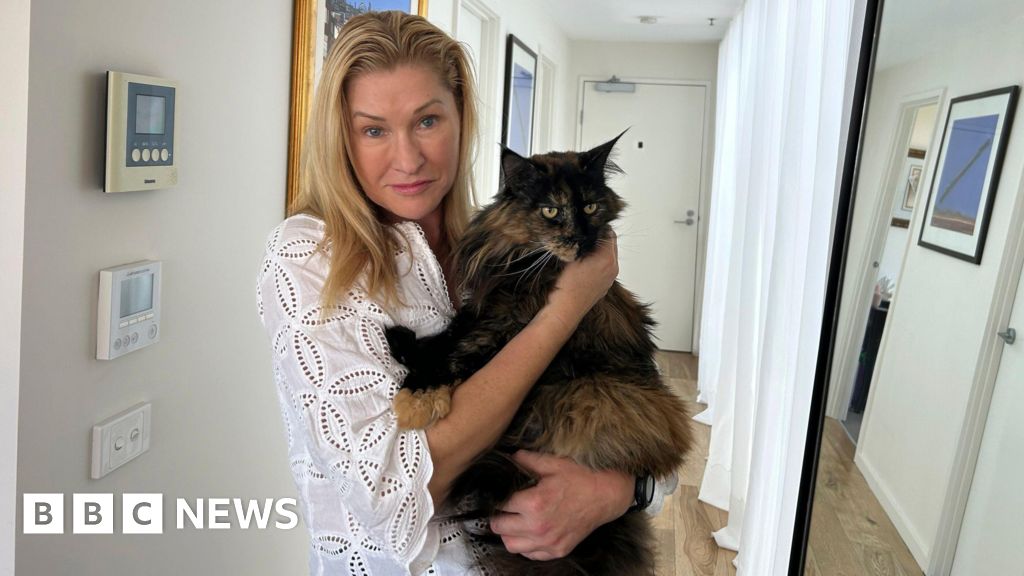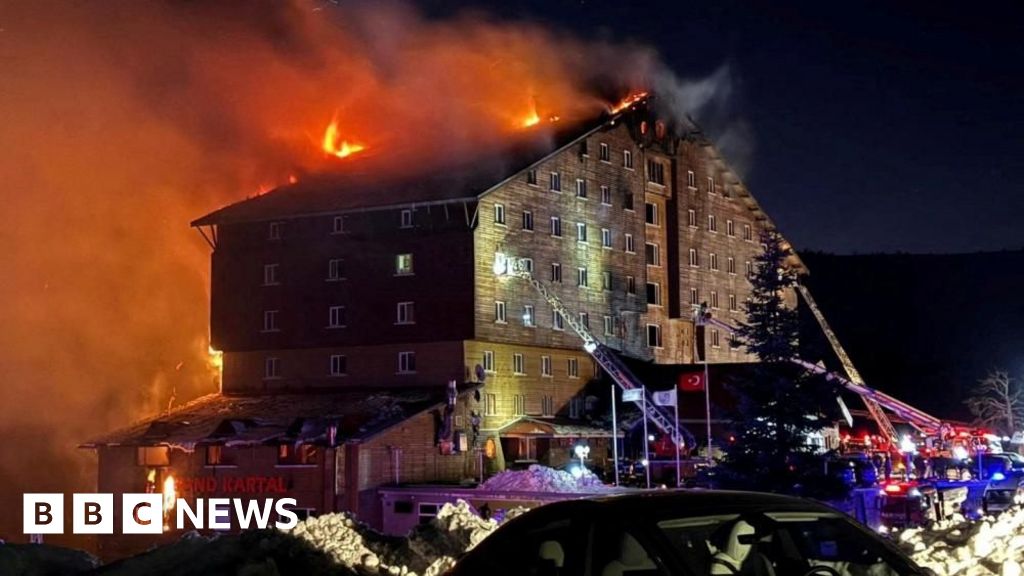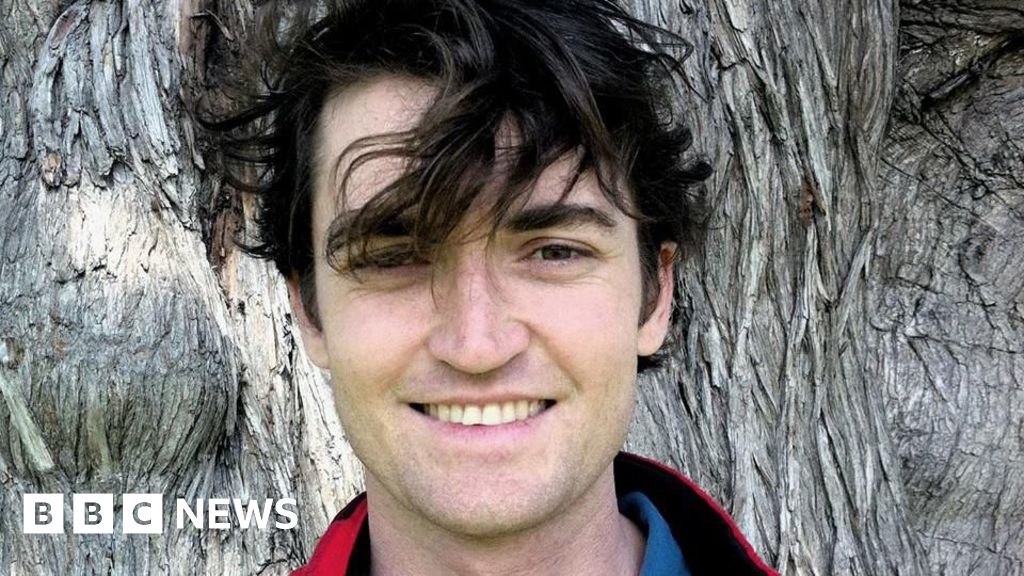ARTICLE AD BOX
 Image source, Reuters
Image source, Reuters
US Secretary of State Antony Blinken was greeted by Saudi officials on arrival in Jeddah
By Tom Bateman, State Department correspondent & Rushdi Abu Alouf, Gaza correspondent
BBC News, in Jeddah and Istanbul
The US secretary of state has flown to the Middle East to discuss a post-war plan to govern and secure Gaza.
Antony Blinken's talks with Arab leaders in Saudi Arabia and then Egypt will focus on what the US calls "an architecture for lasting peace".
It comes as witnesses said Israeli forces had escalated their operation around al-Shifa hospital in Gaza City, carrying out a number of air strikes.
Earlier, Israel's military said it had killed 90 gunmen there since Monday.
Separately, indirect negotiations between Israel and Hamas are continuing in Qatar to bring about a ceasefire and the release of hostages. But there are few signs that a breakthrough is imminent.
Mr Blinken's sixth trip to the region since the start of the war in Gaza saw him land in Jeddah on Wednesday afternoon to meet the Saudi leadership.
Descending from the plane shortly before sundown he was greeted by waiting officials, including Mazin al-Himali from the Saudi foreign ministry, who embraced Mr Blinken.
He is expected to meet the Saudi Crown Prince, Mohammed bin Salman, at the royal palace on Wednesday night.
State department spokesman Matthew Miller said they would discuss efforts to reach a ceasefire agreement and increase aid deliveries to Gaza, amid further dire warnings about the scale of the humanitarian crisis there.
A UN-backed food security assessment this week said 1.1 million people in Gaza were struggling with catastrophic hunger and starvation, adding that a man-made famine in the north was imminent between now and May.
Also on the agenda would be "co-ordination on post-conflict planning for Gaza, including ensuring Hamas can no longer govern or repeat the attacks of 7 October, a political path for the Palestinian people with security assurances with Israel, and an architecture for lasting peace and security in the region", Mr Miller added.
Mr Blinken will travel to Cairo on Thursday to meet Egyptian leaders.
Image source, Reuters
Image caption,A UN-backed assessment says about 210,000 people in northern Gaza face imminent famine
The Americans are trying to bring together a major deal that would put the internationally-recognised Palestinian Authority (PA) back into Gaza for the first time since it was driven out by Hamas 17 years ago.
Nothing has yet been drawn up, but the ideas are thought to include possible support on the ground from Arab nations, while all the parties including Israel would commit to pursuing a two-state solution - the long-held international formula for peace.
The major Arab sponsor Saudi Arabia would normalise relations with Israel in return for access to advanced US weapons and an American-backed civilian nuclear power programme.
However, even if such a multi-part plan could be agreed, US officials concede it is likely only attainable in the longer term.
Meanwhile, Israeli Prime Minister Benjamin Netanyahu has repeatedly rejected the idea of PA control of Gaza. The issue is likely to be another sticking point amid an already fractious relationship with President Biden.
Some of those familiar with the plan concede it feels ambitious given the lack of breakthrough on a ceasefire agreement, the ongoing humanitarian crisis, and because any remaining trust between Israelis and Palestinians is shattered. But the US administration hopes it can still use the moment to grasp the initiative.
Mr Blinken will also travel to Israel on Friday as part of his current trip. According to Mr Miller, he will discuss with Israeli leaders the hostage negotiations and the "need to ensure the defeat of Hamas, including in Rafah, in a way that protects the civilian population".
President Joe Biden has warned Israel that it would be a "mistake" to launch an offensive in the southern city of Rafah, where more than a million displaced civilians are sheltering.
But on Tuesday, Mr Netanyahu said Israel was "determined to complete the elimination of [the Hamas] battalions in Rafah, and there is no way to do this without a ground incursion".
More than 31,900 people have been killed in Gaza since the start of the war, according to the territory's Hamas-run health ministry, which does not distinguish between civilians and combatants.
The conflict began when about 1,200 people were killed and 253 others were taken hostage in Hamas's attacks on southern Israel on 7 October, according to Israeli tallies.
Image source, Reuters
Image caption,Smoke was seen rising from Gaza City as Israeli forces continued their operation in and around al-Shifa hospital
On the ground in Gaza on Wednesday, heavy fighting raged around al-Shifa hospital as the Israeli military's operation there continued for a third day.
Witnesses told the BBC that tanks previously positioned around the hospital complex had now moved eastwards, along al-Wahda Street.
They also reported a significant increase in the number of air strikes in Gaza City and other northern areas.
"The relentless sounds of explosions can be heard from around al-Shifa hospital," said Osama Tawfiq, who lives 700m (2,300ft) from the complex. "Since Monday morning, we feel like as if the war has just begun."
According to the witnesses, the strikes targeted homes belonging to members of Hamas who had been assigned to serve on so-called "emergency committees" in place of the armed group's police force.
Among them was Amjad Hathat, who was reportedly killed along with 11 other emergency committee members at the Kuwait roundabout in Gaza City on Tuesday evening while securing the distribution of humanitarian aid.
Mr Tawfiq said that the situation had deteriorated in his area, after a period of relative calm that followed the withdrawal of Israeli forces in mid-January.
"We are not only enduring bombings but also facing a looming food crisis."
"During last Ramadan, we could break our fast with some food. But now we struggle to find anything beyond water that smells like sewage and tastes like seawater, as well as meagre bread. My children are suffering from hunger."
A UN-backed food security assessment has said 1.1 million people in Gaza are struggling with catastrophic hunger and starvation, and that a man-made famine in the north of the territory is imminent between now and May.
On Wednesday morning, the Israeli military said its troops had killed approximately 90 gunmen and questioned 300 suspects during what it called the "precise operation" in and around al-Shifa.
They first raided the hospital in November, when the military accused it of being a Hamas "command and control centre" - an allegation that Hamas and hospital officials denied.
The military said the latest operation was launched on Monday because "senior Hamas terrorists have regrouped inside... and are using it to command attacks against Israel".
Hamas acknowledged a senior commander of its internal security force was killed there on Monday, but said he was co-ordinating aid deliveries. It said the other people killed were patients and displaced civilians sheltering there.
The military said it was taking measures to avoid harm to civilians and keep the hospital functioning, but witnesses told BBC Arabic's Gaza Today programme that that the situation there was catastrophic and that civilians, including medics, were crowded in corridors.
"Children do not stop crying because they are dying of hunger and thirst... and the wounded suffer all night long due to the lack of medicines and painkillers," one displaced woman, who asked not to be named, said on Tuesday.
"The bulldozers are sweeping away the places where we are staying, and shrapnel is flying above our heads everywhere," she added.
Additional reporting by David Gritten in London

 10 months ago
44
10 months ago
44








 English (US) ·
English (US) ·